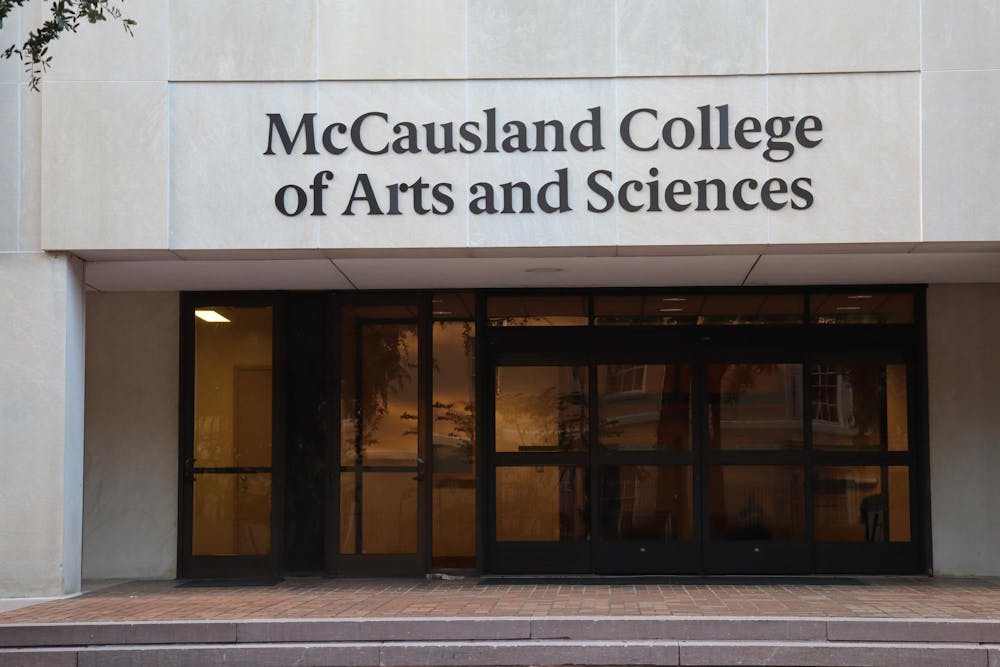Seeing a need for further civic education, the University of South Carolina board of trustees approved a new academic center on June 20, the Center for American Civic Leadership and Public Discourse.
As a part of the McCausland College of Arts and Sciences, the center will oversee new academic programs and host public events on campus, focusing on topics such as the rule of law, liberty and democratic self-governance. Christopher Tollefsen, a philosophy professor at USC, serves as the Interim Executive Director while a search for a permanent Executive Director is underway.
According to a statement announcing the board of trustees’ approval, “The center responds to a growing need for civil discourse, cooperation across partisan lines and a greater understanding of the core ideals and values that shaped America.”
One way the center can expand USC's academic offerings is by creating interdisciplinary minors, Tollefsen said. One planned minor would allow students to study the United States’ founding documents further than what the university already requires, he said.
Tollefsen also hopes to create a philosophy, politics and economics minor that would give students a level of economic literacy but would not require as much instruction in specialized mathematics as is required in the Darla Moore School of Business.
The center also has an undergraduate affiliation program, the Francis Lieber Undergraduate Forum, with a version for graduate students in the works. Members will take an active role in the center and have access to readings with affiliated faculty, small group sessions with the center’s guest speakers and opportunities for grants, according to the center’s website .

“You don’t have to be taking any particular classes at all,” Tollefsen said. “All you need is to be interested in the sort of mission and activities of the center … The price of admission is simply signing up.”
Tollefsen added that he hopes to find funding for forum members to travel to the Statehouse, local courts and potentially Washington D.C.
“I think there’s just no substitute for talking to people who are on the inside of government, for understanding how government actually works,” Tollefsen said. “So I’m envisaging, hopefully by next spring, annual trips up to D.C. for that sort of thing.”
In the next year, the center aims to hire a permanent executive director as well as the first of several permanent faculty members to help with the center’s mission, Tollefsen said. An external advisory board of five academics from around the country has already been selected. There is also an advisory board made up of USC faculty, but those positions have not been made official yet, Tollefsen said.
USC is not the first to open such a center.
Paul Carrese, a member of the new university center’s external advisory board, is a professor at Arizona State University’s School of Civic & Economic Thought and Leadership, which he founded in 2016. He served as its founding director until 2023, and he credits his experience with the school for his position on the USC center’s board.
Mary Keys, another member of the advisory board, is a faculty fellow at the University of Notre Dame’s Center for Citizenship and Constitutional Government. She was also a visiting fellow at Princeton University’s James Madison Program in American Ideals and Institutions, led by Robert P. George.
“I think that experience, together with my research and teaching in political theory, led to my invitation to join the advisory board,” Keys said to The Daily Gamecock.
Carrese said the founding of ASU’s school was the result of a mandate from Arizona’s state government as opposed to a faculty-led effort, causing some controversy. Unlike many similar projects, USC’s board of trustees created the center without an external mandate, which Carrese said is commendable .
South Carolina’s state legislature joined in on a national trend of instituting civics requirements for colleges when it passed the Reinforcing College Education on America’s Constitutional Heritage Act in 2021. This legislation is the basis of USC’s “Founding Documents” course requirement, according to the university’s website.
Carrese added that private universities are also working to create new academic centers and graduation requirements related to civic education.
Upcoming events
For the center’s first event , Robert P. George and Cornel West will come to the Johnson Performance Hall in the business school on Sept. 12.
Both professors are on the new center’s external advisory board. The discussion will focus on how the two remain close collaborators and friends while holding vastly different political and moral values, Tollefsen said.
“They have both an intellectual understanding of what makes their relationship work and a kind of personal understanding of what makes their relationship work, and they’ll be talking about both,” Tollefsen said .
The two recently wrote a book together, “Truth Matters: A Dialogue on Fruitful Disagreement in an Age of Division,” which will be another topic for the September talk.
On Sept. 17, John Witte Jr., a law professor at Emory University, will give a lecture on religious freedom for Constitution Day.

